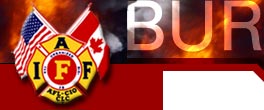|
What We Do
Our
members are trained to a high level of skill in numerous fields.
These include fire fighting, motor vehicle accident extrication,
hazardous materials response, technical rescue, first responder
medical assistance, fire boat and public education. The Fire Department
call volume for 2002 was 9,973.
Fire
Fighting
The
members of the Burnaby Fire Department responded to 4,152 reports
of fire last year. This included residential, commercial and industrial
incidents; vehicle fires; bush and grass fires and various other
fire types. Our members continually train in order to maintain
a high standard of proficiency in such areas as incident command,
“live fire” training, high rise fire fighting, Skytrain response,
driver training and refinery fires. The training grounds at Fire
Station 1 are used daily by our members to familiarize themselves
with new fire techniques and technological changes, as well as normal
operational procedures.
Auto
Extrication
Innovations
by the automobile industry have resulted in increased safety for
vehicle passengers, but in a serious motor vehicle accident they
make our job more difficult and dangerous. The same reinforcing
that protects the vehicle occupants impedes our efforts to treat
and/or free them from the wreckage. Thus we must adapt to new methods
of ‘removing the vehicle from around the patient’, all the while
being careful to avoid deploying the many airbags (which activate
at 300 feet per second) and seatbelt tensioners (which have explosive
charges in them).
We
have many roles at an accident scene. These include, but are not
limited to, protecting the scene and patients from other vehicle
traffic, checking for hazards (electrical boxes/wires down; ruptured
gasoline, propane or natural gas tanks; other fluids or hazardous
materials spilled), preparing the pumps and fire hose lines in case
of fire; stabilizing the vehicles involved and treating and/or extricating
the patients.
Hazardous
Materials
Thousands
of hazardous materials shipments pass into or through Burnaby every
day. They are transported by truck, semi-trailer, tanker truck,
train, ship and other modes of transport. Burnaby has three refineries
and a huge industrial base, including businesses which deal with
a wide variety of chemicals. The potential for an accident or spill
is ever-present.
Every
one of our fire suppression members is trained to a minimum of “awareness
level” in hazardous materials response. That means they can all
respond to and assess such an incident, evacuate and treat persons
exposed to the hazards, set up the decontamination zones and prepare
the scene for the arrival of the entry teams. Other specially trained
members will put on the protective suits, enter the affected area
or building, rescue incapacitated persons and decide on the best
course of action.
Technical
Rescue
Part
of Burnaby’s beauty is its’ diversity, from the high rise office
towers and apartment buildings of Metrotown to the wilderness of
Burnaby Mountain. It is a city which has four town centres yet
is 25% park land. Over sixty of our members voluntarily commit
to be part of the Technical Rescue Team. They have training and
expertise to rescue people who have fallen off the cliffs on the
Mountain, to work off of construction cranes and down the sides
of high rise buildings, and to enter confined spaces such as sewers
to rescue children or workers who have inadvertently become trapped.
First
Responder Medical Assistance
Our
members are trained as First Responders, the first level of a layered
pre-hospital care system designed in the best interests of patient
care and outcome. As such we respond to medical incidents as set
out in the Medical Protocal Dispatch System used by the ambulance
service. We train in Cardio Pulmonary Resuscitation (CPR), Automatic
External Defibrillator (AED) for certain types of cardiac incidents,
and basic medical care. With six fire stations in Burnaby, we can
respond to most incidents within four minutes.
We
would like to receive higher levels of medical training and assist
the public more often, but are prevented from doing so by Provincial
regulations which limit such assistance to members of the ambulance
service. British Columbia is the only province in Canada with this
type of regulation. If you call 9-1-1 someone should arrive within
six minutes. We can and will respond if we are called.
Fire
Boat
Burnaby
and Port Moody share one of the region’s fireboats. We train in
swift water rescue and shipboard fire fighting as there are many
large cargo ships, including tankers, which berth and load in the
Burrard Inlet. Our fireboat crews also have the ability to fight
fires on the shoreline (piers, docks, buildings), as well as respond
to emergencies involving pleasure craft.
Public
Education
Our
public education members spend countless hours educating school
children, residents and businesses of all sizes in fire prevention,
home safety and burn awareness. Our members in the stations provide
the same education to pre-school, early elementary and community
groups (scouts, girl guides). Of all the things we do, this is
one which our members hold dear to their hearts - because educating
children in fire safety and burn awareness may help prevent a lifetime
of pain and scarring.
|

